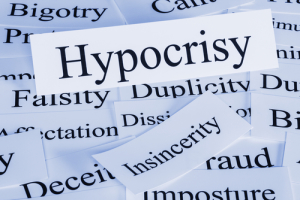Duplicitous Competitive Keyword Advertising Lawsuits–Fareportal v. LBF (& Vice-Versa)

Photo credit: a conceptual look at hypocrisy, insincerity, cant, bigotry, imposture, duplicity // ShutterStock
The participants in today’s case are travel aggregators Fareportal, which runs the dubiously named cheapOair.com, and LBF Travel, which runs SmartFares and Travelation. Last year, Fareportal kicked off the litigation party by suing LBF for buying competitive keyword advertising on Fareportal’s trademarks. LBF retaliated by counter-suing Fareportal for its competitive keyword advertising purchases. Now what–mutually assured destruction?
Although it was filed second, the LBF-initiated lawsuit reached a substantive opinion more quickly than the earlier-filed Fareportal-initiated lawsuit. In the LBF-initiated countersuit, a magistrate judge partially granted Fareportal’s dismissal and partially denied it. The ruling is fairly run-of-the-mill for a motion to dismiss, where the judge must accept the pleadings as true. For example, the court reiterates that purchasing keyword ads constitutes a trademark use in commerce (a result virtually necessitated by the binding 2009 Rescuecom ruling):
We do not see a meaningful difference, however, between a search engine’s act of selling to an advertiser a service derived from the use of a trademark (which Rescuecom unequivocally found to be “use” under trademark law) and the advertiser’s action in purchasing that benefit. Both have “used” the trademark in the same way by engaging in a commercial transaction—the search engine as the seller and the advertiser as the purchaser—to produce a display of search result advertisements that derives from the use of a trademark.
So, who won/lost this ruling? Any win by one party in litigation A will be used against them in litigation B. For example, LBF’s win on the use in commerce question will become highly persuasive authority that LBF made a use in commerce in the Fareportal lawsuit. So is Fareportal happy or unhappy that it “lost” that point?
More generally, who wins when bidding battles over search engine positioning spill over into court? As I’ve shown repeatedly, the financial “damages” from competitive keyword advertising are often trivial. As a result, it seems almost inevitable that the only winners from these companion lawsuits will be the lawyers who act as arms dealers to the combatants. Normally, I believe that litigants suing over competitive keyword advertising would find it more profitable to invest their legal costs in more marketing rather than shoving the dough to the lawyers. I suspect that would have been true in these cases as well.
I’m also left wondering how consumers were disadvantaged by the parties’ competitive keyword advertising practices. Indeed, the court dismissed the state deceptive practices claim because LBF didn’t show sufficient consumer harm. I’d be surprised if either party succeeds in showing legally cognizable consumer confusion in their cases. After all, the evidence is growing that such confusion simply doesn’t exist.
Case citation: LBF Travel, Inc. v. Fareportal, Inc., 2014 WL 5671853 (S.D.N.Y. Nov. 5, 2014)
Some Related Posts
* Trademark Owners Just Can’t Win Keyword Advertising Cases–EarthCam v. OxBlue
* Florida Allows Competitive Keyword Advertising By Lawyers
* Another Keyword Advertising Lawsuit Unceremoniously Dismissed–Infostream v. Avid
* Another Keyword Advertising Lawsuit Fails–Allied Interstate v. Kimmel & Silverman
* More Evidence That Competitive Keyword Advertising Benefits Trademark Owners
* Suing Over Keyword Advertising Is A Bad Business Decision For Trademark Owners
* Florida Proposes to Ban Competitive Keyword Advertising by Lawyers
* More Confirmation That Google Has Won the AdWords Trademark Battles Worldwide
* Google’s Search Suggestions Don’t Violate Wisconsin Publicity Rights Law
* Amazon’s Merchandising of Its Search Results Doesn’t Violate Trademark Law
* Buying Keyword Ads on People’s Names Doesn’t Violate Their Publicity Rights
* With Its Australian Court Victory, Google Moves Closer to Legitimizing Keyword Advertising Globally
* Yet Another Ruling That Competitive Keyword Ad Lawsuits Are Stupid–Louisiana Pacific v. James Hardie
* Another Google AdWords Advertiser Defeats Trademark Infringement Lawsuit
* With Rosetta Stone Settlement, Google Gets Closer to Legitimizing Billions of AdWords Revenue
